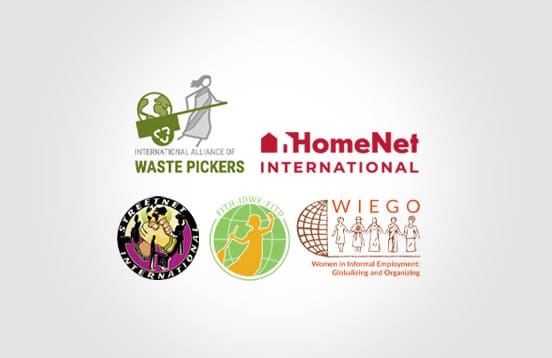Extreme weather events are having a dire impact on workers and communities everywhere: from Greece and Canada to India, Ghana and Brazil. And with the world off-track in reducing greenhouse gas emissions according to the Paris Agreement targets, global temperatures are projected to increase, having catastrophic effects.
The need for governments, corporations, workers’ organizations and civil society to take urgent and decisive action on the climate emergency is clearer than ever. But several fossil fuel-producing countries, including the United Arab Emirates (UAE), are set to increase their production, and none have committed to reduce coal, oil and gas production in line with limiting warming to 1.5°C.
As organizations representing over 4.6 million workers in informal employment around the world in largely women-dominated sectors, we stand in solidarity with our fellow workers who face the worst impacts of the climate crisis, and who need meaningful, urgent climate action.
Workers in informal employment are at the frontline of climate change mitigation: they help reduce pollution and greenhouse gas emissions. At the same time, their well-being and income security are under threat due to rising incidents of pollution, heatwaves, weather extremes, declining biodiversity and floods, intense storms and wildfires, coupled with a lack of basic services such as energy and water.
Participants at COP28 are expected to discuss the first global stocktake of the world’s progress towards the targets of the Paris Agreement, and to operationalize the loss and damages fund – set up to provide financial assistance to nations most vulnerable and impacted by the effects of climate change.
We urge participants at COP28 to consider workers in the most vulnerable sectors such as domestic work, home-based work, waste picking, street vending and market trading by:
Making the transition to a green economy fair, inclusive and centred on care
Workers in informal employment are already being affected by efforts to reduce carbon emissions and other forms of pollution and slow climate change. A just transition leaves no workers behind and promotes decent working conditions.
A first step towards an inclusive just transition framework for workers in informal employment is recognizing their work and their tremendous current and potential contribution to reducing carbon emissions, as well as to mitigating the impacts of climate change and other forms of pollution.
Workers in informal employment recycle, reuse and repair materials. They produce goods from natural and degradable materials. They shorten supply chains and support communities through street and market vending; and carry a light carbon footprint.
Many of these forms of work are environmentally and socially sustainable. They are part of the solution.
An inclusive just transition framework must value the contribution of workers in informal employment, support their legal recognition in labour and social protection regulations, ensure their care needs are met through adequate national care systems and support their Social and Solidarity Economy models.
Ensuring workers are directly involved in climate policy-making & implementation processes at all levels
The COP28 Presidency stated that among its objectives were to hold the “most inclusive COP” and drive policies and action that put nature, lives and livelihoods at the heart of climate action.
If participants are serious about putting livelihoods at the heart of climate action, they must consider the needs of the global majority of workers: the 2 billion people who work in informal employment around the world, who are already facing climate disasters and the job losses and displacement that have followed.
These workers must be directly involved at local, national and international levels in the design and implementation of climate action policies and strategies and have access to climate financing. This could be done through the establishment of public governance committees, social dialogue spaces or fora composed of interested parties (all of which should include representation from workers in informal employment and other groups disproportionately impacted by climate change).
Workers in informal employment are calling for climate justice.
The undersigned organizations are members of the growing global movement of informal economy workers and together represent over 4.6 million members worldwide.
HomeNet International
Janhavi Dave, International Coordinator
International Alliance of Waste Pickers (IAWP)
Lucía Fernández, Interim General Secretary
International Domestic Workers Federation (IDWF)
Adriana Paz, General Secretary
StreetNet International
Oksana Abboud, International Coordinator
Technical Support
Women in Informal Employment: Globalizing and Organizing (WIEGO)
Sally Roever, International Coordinator
